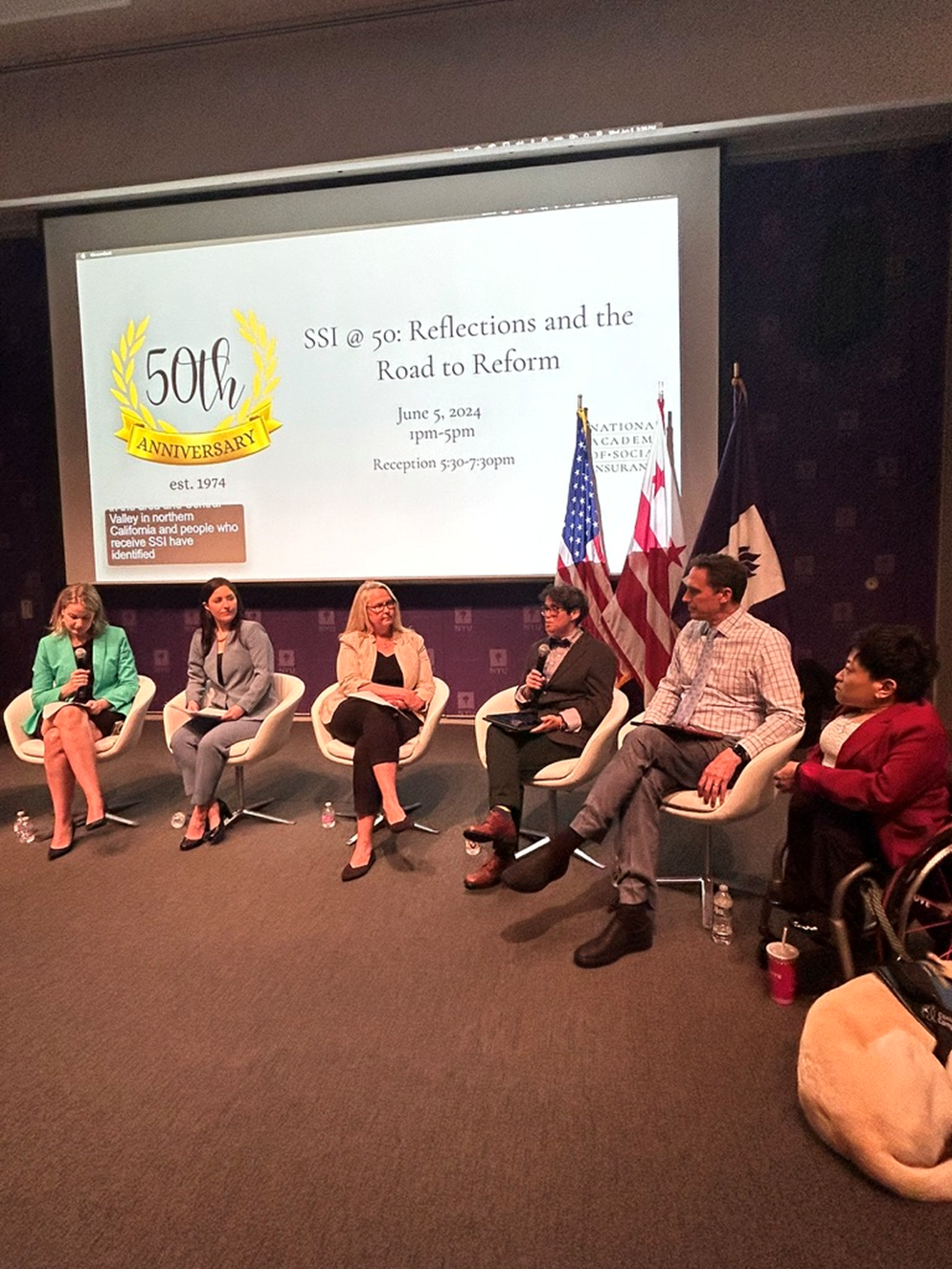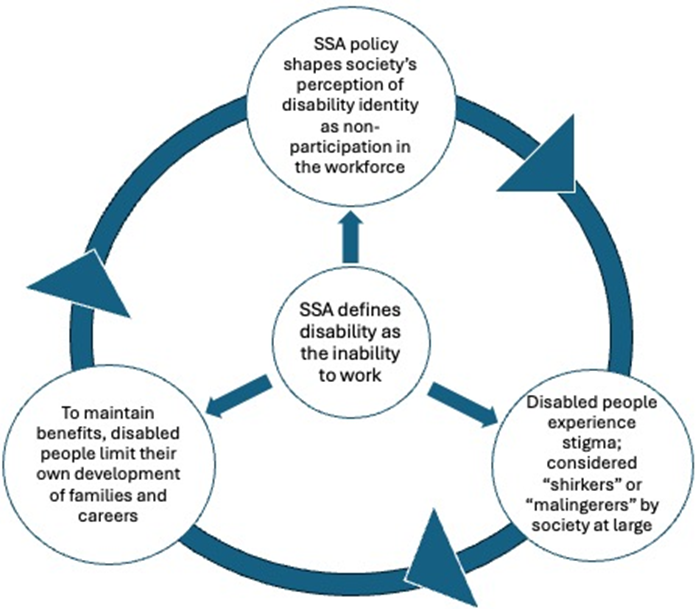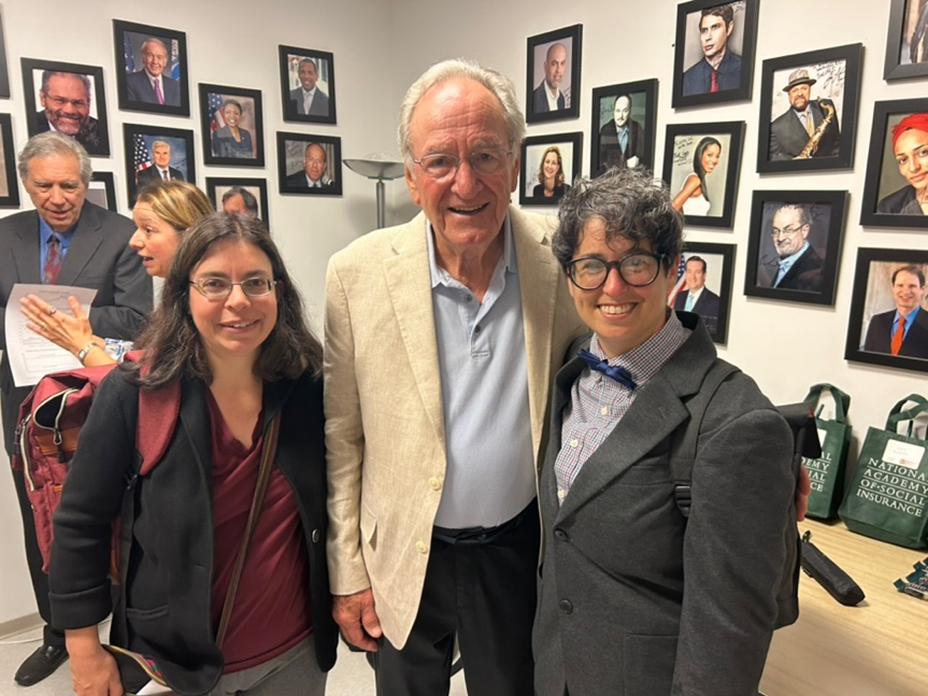Support Page Content
Community-Informed Disability Policy Research & Practice
Purpose
The experience of disabled people in the United States is significantly shaped by health and social policy and policy administration, which are all too often designed by non-disabled people situated as experts. As disability policy shapes the lives of disabled people, societal attitudes about disability are informed by the ways people see disabled people living. In this way, factors such as poverty, isolation and unemployment are seen as intrinsic aspects of disability, rather than policy outcomes, and disabled people are stigmatized.
The goal of this community-based research into disability policy is to work with disability communities to highlight the perspectives of those most impacted. We strive to identify ways that policy and its administration can negatively shape the disability experience while providing recommendations for intervention. The research process and methods are rooted in a Disability Justice approach and informed by critical theories such as DisCrit and Critical Disability Studies. Project researchers are informed by their own experiences of disability and disability benefit receipt.
For questions or inquiries about ongoing and future projects, please contact Dr. Katie Savin at savin@csus.edu.

Social Security Model of Disability (Savin, 2024a, 2024b)

Media, Publications & White Papers
- Savin, K., Chung, E., Jones, N., Sterzing, P., & Chaudhry, V. (Summer 2024). Lessons from Critical and Transnational Disability Perspectives for Social Work. Journal of Sociology and Social Welfare. (In press)
- Savin, K. (Summer 2024). “Everyone else gets to have the American dream”: How Social Security disability policy shapes disability identity. Journal of Sociology and Social Welfare. (In press)
- Savin, K. (Fall 2024). “We are a compromise:” A Social Security model of disability during Covid-19. In J. Reynolds & M. Gary (Eds.) Disability justice in public health emergencies. Routledge.
- Savin, K. & Guidry-Grimes, L. (Fall 2024). Disability rights and disability justice as gestalt shifts for triage decision-making in a pandemic. In J. Reynolds & M. Gary (Eds.) Disability justice in public health emergencies. Routledge.
- Savin, K., Morris, Z. A., Wise, M. S., & Marinoff, R. (2024) “Every day you are working you have to prove it”: Navigating the costs of work and ableism with visual impairment. Journal of Vocational Rehabilitation, (Preprint), 1-13. https://ip.ios.semcs.net/articles/journal-of-vocational-rehabilitation/jvr240000
- Savin, K., Guidry-Grimes, L., & Kates, O. S. (2024). What Does Disability Justice Require of Antimicrobial Stewardship?. AMA Journal of Ethics, 26(6), 448-455. https://journalofethics.ama-assn.org/article/what-does-disability-justice-require-antimicrobial-stewardship/2024-06
- Assessing Administrative Burden Among Supplemental Security Income Recipients. Research funded by the University of Wisconsin-Madison Center for Financial Security, Retirement & Disability Research Center.
- Research Brief (2023)
- Working paper (2023)
- Savin, K., Morales, A., Levi, R., Alvarez, D., & Seligman, H. (2021). “Now I Feel a Little Bit More Secure”: The Impact of SNAP Enrollment on Older Adult SSI Recipients. Nutrients, 13(12), 4362. https://www.mdpi.com/2072-6643/13/12/4362
- 26th Annual RDRC Meeting, August 7-9, 2024 at the National Press Club in Washington DC Free & open to the public: Details and registration
- Mathematica’s Center for Studying Disability Policy’s National Disability Employment Awareness Month Roundtable, October 2024, details and registration forthcoming
Research Team
Lead Researcher
Katie Savin, PhD, MSW (they/them)
Graduate Student Research Assistants:
Tooba Ishaq
Maria Arellano
Collaborators:
Nev Jones Assistant Professor, School of Social Work, University of Pittsburgh.
Carolyn Barnes, Associate Professor, Crown Family School of Social Work, Policy, and Practice, University of Chicago
Rebecca Vallas, CEO, National Academy of Social Insurance
Current Research Partnerships & Projects
A Qualitative Investigation of Work-Related Decision Making Among SSI Recipients
(Savin & Jones, 2024)
This yearlong grant project, funded by the Social Security Administration (SSA) to inform their policy making, will use community-based participatory research (CBPR) techniques alongside qualitative methods across two research sites (in Sacramento and Pittsburgh) to explore how SSI recipients approach work-related decision making.
Social Security’s Supplemental Security Income (SSI) is a public assistance program that provides monthly cash benefits to people with disabilities and older adults who have not participated in formal work. Average SSI benefit levels reach just below the Federal Poverty Line, and recipients must navigate a web of complex and outdated administrative policies to maintain benefits. A significant body of research demonstrates that people who participate in SSI rarely return to the workforce in their lifetimes. Simultaneously, qualitative and survey research often finds that people receiving disability benefits desire to work yet face perceived employment disincentives and barriers.
This exploration is twofold: First, it takes up questions of how individuals’ ethnoracial and disability backgrounds may impact their orientation towards the potential risk of returning to the workforce; and second, it explores potential barriers to employment as they relate to recipient understanding of SSA policy and associated administrative burden. This project is conducted in partnership with Rebecca Vallas at the National Academy for Social Insurance (NASI) who will support dissemination efforts. Findings will inform SSA on reasons why SSI recipients choose to engage in work - both formal and informal - or not, and the role of structural inequities and SSA policies in these decision-making processes.

(Pictured L-R: Nev Jones, (Ret.) Sen Tom Harkin, Katie Savin)
Past projects
Assessing Administrative Burden Among Supplemental Security Income Recipients (2022-2023)
Supplemental Security Income (SSI) recipients often manage multiple benefit programs to manage their health and disability and make ends meet. The administrative burden of accessing and maintaining SSI and additional benefits can be very onerous to recipients, who are particularly vulnerable to its impacts as a population navigating both poverty and disability. This qualitativefocused mixed methods study used administrative data from California to describe the population of SSI recipients who simultaneously receive CalFresh, the state’s SNAP benefit, after a 2019 policy change newly permitted dual enrollment. In the qualitative portion, 17 working-age SSI recipients participated in in-depth interviews and follow-up feedback groups in English and Hmong to explore how administrative burden impacted them and what strategies they used to address it. A team coding approach to thematic analysis was used to analyze transcript data using the analysis software Dedoose.
Quantitative findings show widespread though inequitable CalFresh take-up among SSI recipients, indicating a need for increased outreach efforts to communities with limited English proficiency. Qualitative findings suggest that the psychological costs of administrative burden that participants encounter, such as disability- and welfare-related stigma and chronic stress, amplify their experiences of compliance and learning costs. In this context, SSI benefit–related burden was primary for participants, who in turn assessed the administrative burden they encountered in additional benefit programs relatively—in comparison to SSI—rather than additively. Low levels of trust in SSI reported by participants seemed to increase the psychological costs and learning costs of administrative burden they experienced. Strategies such as the introduction of eligibility screeners for non-SSI benefits during continuing reviews and the reduction of the frequency of income and asset reporting could decrease the costs of administrative burden.
Keywords: SSI, disability, qualitative research, administrative burden, psychological costs
JEL Classification Codes: SSI, welfare policy, human capital, poverty